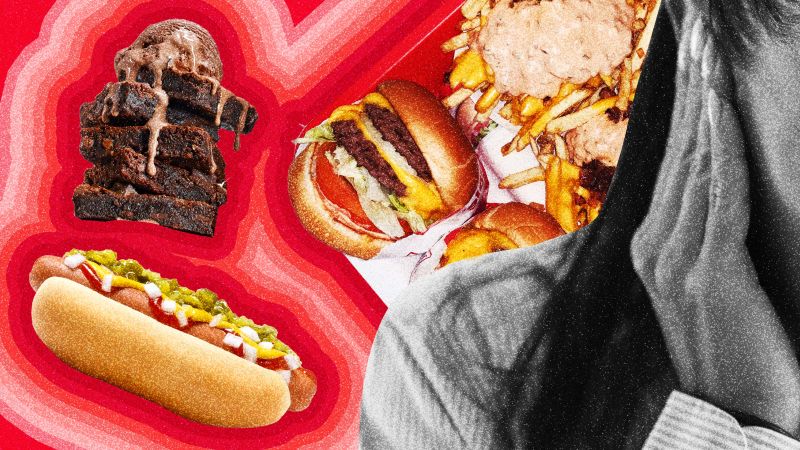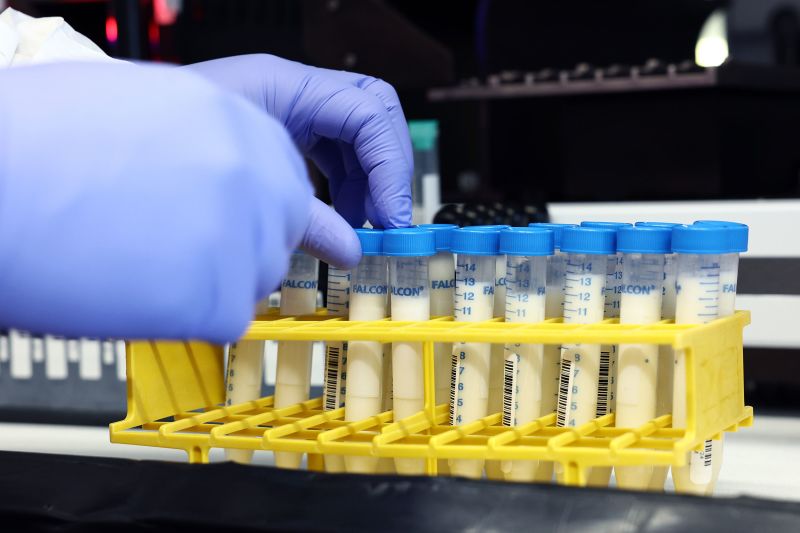‘An insatiable itch’: Why some people are turning to weight-loss medications to help quiet food noise

Savannah Mendoza used to spend most of her paychecks on food delivery apps and at fast food drive-thrus, trying to satisfy a compulsive craving.
After she started taking a popular medication used for weight loss and diabetes, she saw it as something else: food noise.
“It’s so obsessive, and it’s not a good feeling. It’s a very ugly feeling, because you’re just locked down on that singular thought of you wanting to eat,” she said.
Food noise is incessant internal chatter about food that some people experience, which can make it hard for them to make healthy decisions about their nutrition. The conversation around it has grown, especially online, as more people taking popular weight-loss and diabetes medications realized the drugs seemed to turn off the noise.
Semaglutide and tirzepatide are both glucagon-like peptide-1 receptor agonists, known as GLP-1s, that work by telling your body that you just ate, triggering it to release more insulin and slowing the movement of food through your stomach. The medications are prescribed to treat type 2 diabetes under the brand names Ozempic and Mounjaro, and their twin versions Wegovy and Zepbound have also helped millions of people lose weight.
Mendoza, 27, started to constantly think about food when she was in her early 20s. She would claim she had to run errands but instead hit up a drive-thru and eat in the car. On some mornings, she would sneak bites of ice cream straight out of the tub while packing her daughter’s lunch.
“I just thought I was obsessed with food,” said Mendoza, who lives in Huntington Beach, California.
Now that she’s using tirzepatide, she said, she feels peace without the food noise and notes that part of what stopped it is a side effect of the medication: She physically feels “kind of always bloated and not hungry.”

Summer Kessel, who has been using tirzepatide for over two years, said she was a “bottomless pit” who always felt hungry.
“I would still be thinking about, planning for, trying to finagle how I could eat something else,” said Kessel, 37. “I would have breakfast at home, then breakfast at work, and then lunch at work, and then a snack before I left work, and then fast food on the way home and then dinner when I got home.”
A week after her first injection of the weight-loss medication, the Tampa, Florida, native said it was a “relief.”
“It was like, suddenly, all of that noise in my brain about ‘what can I eat, where can I eat, how much can I have, am I going to like it, how many calories is this, what’s the portion size?’ Like all of that sh*t in my head was finally quiet, and I was able to just go about my life without obsessing about food or being hungry all the time,” Kessel said.
Kessel, a registered dietitian who has worked in health care for 20 years, now also doles out nutrition advice to a sizeable social media following. Yet she says it wasn’t until she got on tirzepatide that she was able to practice what she preached and actually eat three balanced meals a day.
“I feel appropriately hungry at mealtimes. … I’m just not hungry in my head in between, and I’m not thinking about food in terms of what’s the tastiest or what do I want. It’s more like, what do I need to feel nourished and satisfied, and is going to make my body feel good,” she said.
The science behind food noise
There are varying theories about the root cause of food noise, and there isn’t a clear number of how many people experience it. But most experts believe it’s real, even if awareness of it is only recently emerging.
About 15 years ago, Dr. Michael Lowe, a professor in the Department of Psychological and Brain Sciences at Drexel University in Philadelphia, developed a theory called hedonic hunger, which he explains as “an intense desire for food-based pleasure for reasons other than physical hunger.” Lowe said this theory and its associated Power of Food Scale are being used in clinical trials of weight-loss medications in both adults and children to measure what he describes as the “desire for delicious foods when not hungry.”
“That is, the previously established concept of hedonic hunger appears to be very similar to the concept of food noise reported by many on GLP-1 medications,” Lowe said. “I also studied appetite, or how people experience and attempt to control their appetite, my whole career. Researchers have studied our built-in system for letting us know, or giving us advance notice of, our bodies’ need to be replenished with calories. What this doesn’t take account of is why, in the past 45 years, many of us have gained weight by eating more than what our bodies need to stay healthy.”
The rumbling in your stomach near dinnertime is homeostatic or “normal” hunger — “a reminder from your body that the calories you consumed for lunch have been mostly utilized for fuel by your body,” according to Lowe.
Hedonic hunger, on the other hand, is continuing to desire and eat food beyond the calories that your body needs, even after you just finished a meal.
“I’m saying that when we eat because we need calories, pleasure ‘comes along for the ride.’ But when we still have a powerful drive to eat when we’re not physically hungry, pleasure is the ride, the actual reason we still want to eat,” he said.
Your food environment matters
Some hedonic hunger is to be expected due to America’s food culture, Lowe says. With fast-food restaurants studding every main road and a lack of supermarkets offering fresh food in some areas, “it is so easy to get food, and it’s so easy to eat too much of the wrong kind,” he said.
Jackson LeMay, who lives in Lilburn, Georgia, said his experience with food noise – “a constant, insatiable itch” – lasted over a decade and dates to high school.
Back then, food noise “was a lot of hiding food, a lot of going and taking food from the pantry or from the fridge and hiding wrappers. It was a lot of eating food when I wasn’t home or asking for extra money, saying I needed lunch money, and going to the vending machine, things of that nature.”
As an adult, he said, targeted social media ads and the constant availability of food delivery made it easy to binge and hard to stop.
The 27-year-old lost 155 pounds through diet, exercise and Mounjaro, which he continues to use to maintain his weight, and said he didn’t realize how much food noise affected him until he started the medication.
“You don’t really realize how poor your relationship with food is or how obsessed your brain is with eating and making the making the decisions around food … because that’s ingrained,” said LeMay, who has a part-time role as a content creator for a telehealth company that prescribes weight-loss medications.
Dr. Najaf Asrar, an endocrinologist and obesity medicine specialist at Advocare North Brunswick Medical Associates in North Brunswick, New Jersey, works next to a cookie store. Every time he looks out the window, he thinks about buying a box for his family.
“Food noise is fueled significantly by our environment and the things being pushed on us. I think there is a psychological component. We didn’t used to have whole stores devoted to dessert,” he said. “Food noise becomes a pattern through our environment.”
Asrar works with his patients using weight loss medications in conjunction with lifestyle modifications.
“I tell my patients that obesity is a lifelong disease, but medication doesn’t have to be lifelong,” he said. He’s noticed that once some of his patients reach their goal weight, they are able to rewire their brains, and the food noise doesn’t seem to affect them as much.
Is rewiring your brain possible?
Although GLP-1 medications may appear to be a solution for some people with overweight and obesity who are experiencing food noise, they aren’t necessarily the only option – and they may not even be an option for people with food noise who have a normal BMI.
“What we are starting to learn and come around to the idea of is the thinking that the experience [of food noise] may be driven by the signals from your stomach or your body in a way that we didn’t fully appreciate before,” said Dr. Tom Hildebrandt, director of the Center of Excellence in Eating and Weight Disorders at Mount Sinai Health System in New York.
He describes food noise as a set of peripheral signals that lead to an excess amount of thinking and feeling food-related cues, which society tends to attribute to a lack of control.
“Maybe it’s not just personal responsibility, but in fact, they have a metabolic condition that changes the way a person’s brain experiences hunger, fullness and how you feel in your skin, the body-image related problems that we think of when we think of eating disorders,” Hildebrandt said. With an abundance of food choices in an overstimulating environment, it’s challenging to choose correctly.
At the Center of Excellence in Eating and Weight Disorders, Hildebrandt says, his team treats food noise through 12 to 20 sessions of cognitive behavioral therapy intervention that establishes two things: inoculating against a “toxic food environment and learning how to self-regulate the system that may have been disturbed by attempts to manage – or restrict – the food noise.”
“It doesn’t work in everybody, but it works very well,” he said. “What you’ll see in that context for most people is that food noise goes down, and they’re able to approach their life much more functionally and effectively.”
Doctors at Hildebrandt’s center may also prescribe antidepressants or Vyvanse, a medication used to treat binge-eating disorder, before turning to GLP-1 medications.
“We’re waiting for the science to tell us that it’s really effective at reducing food noise before we would move it up on the triage list, because there are other things pharmacologically, as well as psychotherapy-wise, that we know to be effective,” he said.
People with food noise may find that the GLP-1 medications fix their metabolic signals and reduce brain chatter but create another problem, according to Hildebrandt: a new fear that a food may harm you or make you feel bad.
“And if you’ve talked to people who have used GLP-1s, it’s not uncommon for you to eat a certain type of food or certain amount of food and feel physically uncomfortable. It feels bad, and that’s part of what makes it work. But that signal, like you’re learning from your own experience that that’s the case, you start to fear food in a different kind of way.”
How might GLP-1s help?
Zepbound and Wegovy aren’t a treatment for food noise, but some patients say the effect was undeniable for them.
Kessel, the dietitian in Florida, said that even if she never lost a pound, she would be happy on Mounjaro “just for the food noise to be quiet.”

The medications have two benefits, according to Lowe: they reduce food noise and they can help people lose more weight than older medications or lifestyle changes alone.
- Sign up here to get The Results Are In with Dr. Sanjay Gupta every Friday from the CNN Health team.
“This medication is targeted to the underlying physiology of excessive appetite, more than normal appetite. And it literally changes the chemical makeup, specifically in relation to brain pathways and hormonal pathways that help spark the desire for food when you don’t need it, and help reduce the chronic thoughts of food,” Lowe said. “It comes very close to being a magic pill because it produces larger weight losses, greatly reduces unpleasant food obsessions and requires little self-control to achieve these benefits.”
LeMay said his diet improved almost immediately after he started Mounjaro, but he still enjoys mealtimes.
“Before the medication, I was truly living to eat. Now, I’m eating because I need to live. I’m eating because I need to nourish my body. I’m eating because I want to have energy and I want to feel good,” LeMay said.









